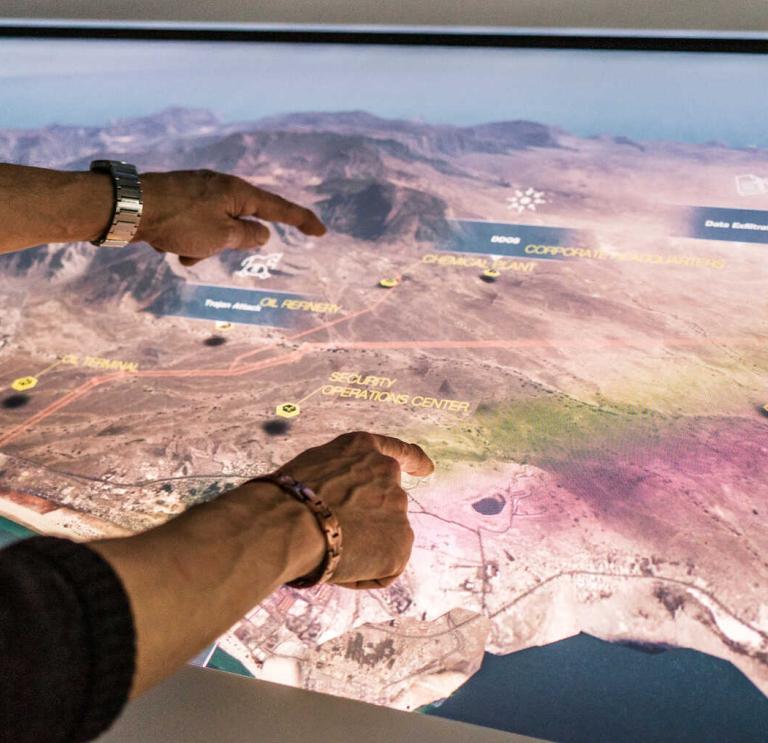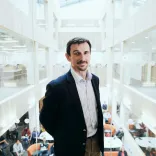Business backstory
But the world is under siege from invisible, malign forces: cyber attackers. Around half of British firms were hit by some form of attack in 2017. The notorious WannaCry malware caused mayhem in the National Health Service, and in companies worldwide.
“There’s never a boring day at the office,” says Ian Goslin, the UK head of Airbus CyberSecurity in Newport.
They specialise in defending companies, government and defence organisations against malicious attacks from … well, anyone and everyone.
“It could be a kid in his loft, or hacktivists with a political agenda,” says Ian. “Then there’s criminal activity, and industrial espionage: Airbus has an enormous amount of IPR (intellectual property rights), as do lots of our customers. And if you’re involved in defence, state actors are also a threat. So the threats come from everywhere, and we have to be ready to protect from all of them.”
They’re very good at what they do. So much so, they’re entrusted to protect the Ministry of Defence’s vast secure communications network, which includes around 300,000 user terminals in the UK alone, as well as assets overseas. They deliver NATO’s Deployable Communication and Information System, providing an ‘office in the field’ for NATO operations and they are also aligned very closely with the National Cyber Security Centre (NCSC) and its parent organisation, Government Communications Headquarters (GCHQ), based in Cheltenham.
Andrew Harmsworth, who leads the Airbus secure communications team, says: “We manage and protect one of the largest information infrastructure systems in Europe. So that’s a real badge of honour we wear with pride. We’ve been protecting UK Defence communications for over 20 years, and in that time they haven’t had a major outage as a result of a hack or unplanned event. And that’s thanks to the work and skills that we have in this area.”
They can protect anything from being hacked, anywhere – even if it’s an RAF Typhoon fighter flying at Mach 2 over a war zone. Everything on the aircraft is encrypted – GPS signal, communications, radar, weapons. The problem is, you have to change the encryption for each mission, which means re-keying the fighter as quickly as possible when it lands.
“To keep operational tempo, you want that aircraft in and out as quickly as possible,” says Ian Goslin. “It’s like a Formula 1 pit-stop: the boys will come smashing out, refuel and rearm, re-key the encryption. We changed the time it took to re-key the aircraft from 19 minutes down to 90 seconds.”
These military applications are filtering down into the civilian world, says Andrew Harmsworth: “The MoD has the ultimate requirement, because you don’t want anyone to be able to hack into a plane and drop a bomb. But with the increasing threat from virus attacks, and the loss or theft of data and intellectual property, that requirement is flowing down into the commercial world. That’s where our opportunities are growing. The awareness of the importance of IT security is rising in emergency services, government, utilities, critical national infrastructure. It’ll flow into financial services, the public sector, schools.”
Airbus and its customers sailed through the WannaCry outbreak without the tiniest blip. But other attackers will try again. In the Airbus Secure Operation Centre at Newport, where customers are monitored and protected 24/7, one of their customers registered 1.5 billion incidents in a single month.
“Not all of those incidents will be attacks,” says Ian Goslin. “Some will be anomalies, some may be early probes. But to use a terrorism analogy, an attacker only has to be lucky once. We have to be ready 1.5 billion times. And that’s what we do exceptionally well.”
How has the Welsh Government helped?
There’s a strong pedigree of communications expertise in Newport. It’s the old stomping ground of hi-tech billionaire Sir Terry Matthews, and there’s a long history of business support to develop the area’s cyber skills.
Ian Goslin says: “We’re a high-end technology business, and the skill sets we have here are certainly best of class in the UK. We’re recognised as a centre of excellence for cybersecurity and cryptography, and that draws people into Wales. The Welsh Government was very encouraging in terms of us locating here, and their support continues to be a reason we wish to stay.”
Why Wales?
Airbus is also helping to train the next generation of cyber experts. In 2017 it co-launched the Centre of Excellence in Cybersecurity Analytics at Cardiff University, whose research aims to protect corporate IT networks, intellectual property and critical national infrastructure (CNI). It also supports the Newport-based National Cyber Security Academy at the University of South Wales.
Airbus also forms partnerships with local companies like Oakdale-based General Dynamics and Axiom, a highend manufacturer in Newbridge. With a growing expertise in Wales, and a growing demand for cybersecurity worldwide, it’s a good time –and place – to be in this line of work.
“There’s a real growth potential for us here in Wales,” says Ian. “We’re proud of being a Welsh anchor company, and we want to continue a relationship that’s beneficial for both of us. We pride ourselves on actively investing and being ahead of the threat.
“The perfect protection doesn’t exist. Everyone is vulnerable to the absolute unknown, the zero-day attack: something that nobody’s ever seen before, and suddenly it explodes. What we pride ourselves on is that we’ve thought about that. It’s not the fact that you get knocked down, it’s that you get straight back up and you’re still protected. It’s a constant fight and we’re continuously improving. We’re used to it, and we’re good at it.”
Learn more about Airbus CyberSecurity on the Airbus CyberSecurity website.




